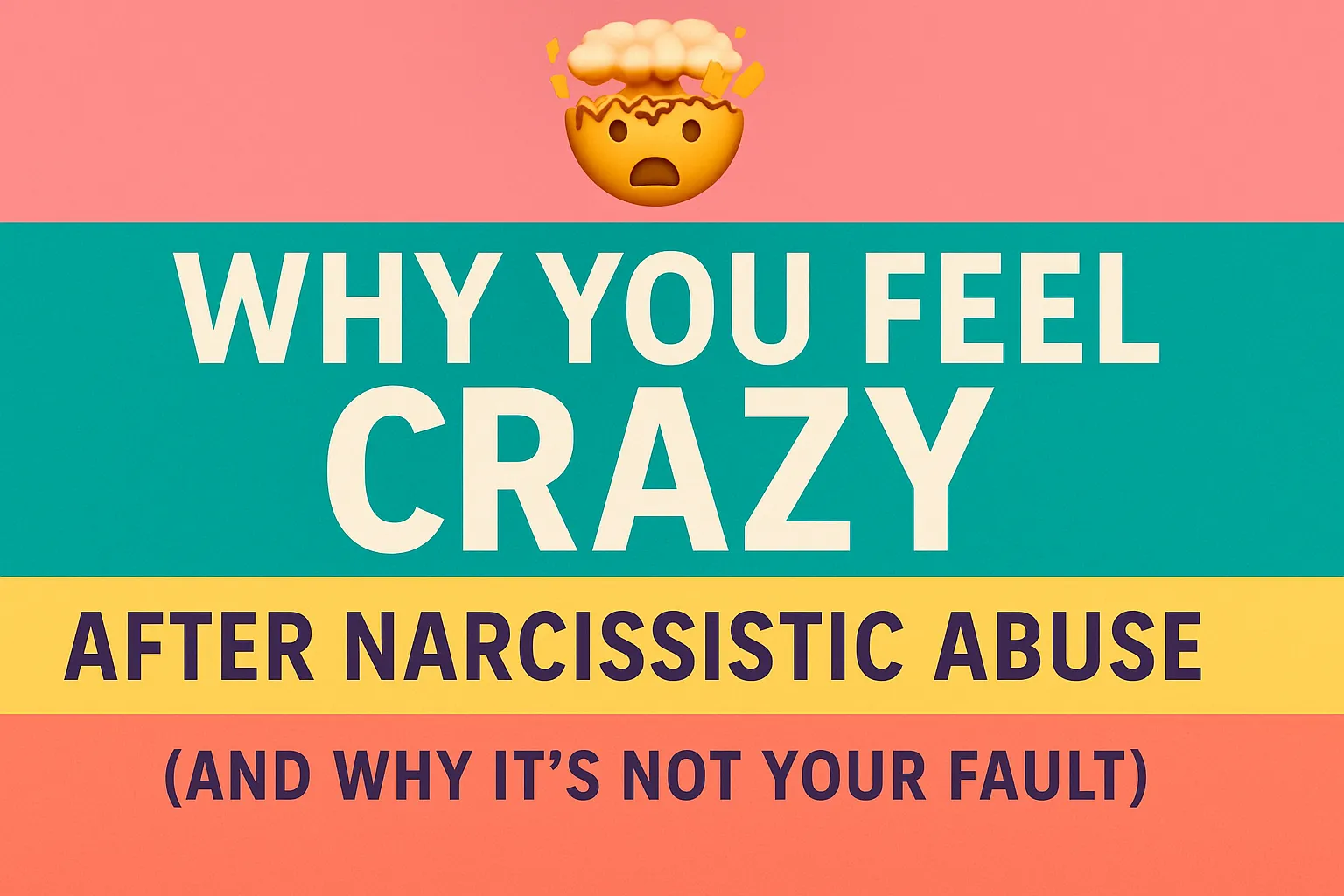🤯 Why You Feel Crazy (And Why It’s Not Your Fault)
If you've ever found yourself asking, "Why do I feel like I’m going insane?" after a toxic relationship — you're not alone. You're also not crazy. You're likely a survivor of gaslighting, narcissistic manipulation, or emotional abuse. And everything you're feeling right now? Is valid.
🤯 “Why Do I Feel So Crazy?” — Understanding the Fog
One of the most common after-effects of narcissistic abuse is a sense of mental fog — like you're walking through life second-guessing everything. You might feel confused, unsure of what’s real, or even experience panic over simple decisions.
“Gaslighting is mind control to make victims doubt their reality.” — Dr. Robin Stern, author of The Gaslight Effect
This isn't a flaw in you. It's the result of a slow, subtle erosion of your inner compass — done by someone who needed control more than they cared for your wellbeing.
🧠 The Psychology of Gaslighting & Narcissistic Projection
Gaslighting works by feeding you lies so frequently, you begin to distrust your own reality. Narcissists often project their own issues onto you:
- You catch them cheating → They accuse you of being “too jealous.”
- You express hurt → You're told you’re “too sensitive.”
- You try to set boundaries → You’re labeled “toxic” or “manipulative.”
This projection is strategic. It keeps them blameless while shifting all emotional labor onto you.
💣 How Narcissists Break Down Your Identity Over Time
It rarely starts with cruelty. In fact, most narcissistic relationships begin with a "love bombing" phase — intense flattery, attention, and promises of forever.
Then it shifts:
- Subtle put-downs disguised as jokes
- Silent treatment when you voice a need
- Gaslighting your memory of events
- Isolating you from friends and family
Over time, you become a shell of yourself. But the scariest part? You still crave their validation.
🧩 Confusion, Anxiety, Panic — Normal Responses to Toxic Love
According to trauma therapist Shannon Thomas, these symptoms mirror those of PTSD. And that’s because emotional abuse is traumatic. You might experience:
- Racing thoughts or obsessive mental replay
- Fear of being “too much” or “not enough”
- Hypervigilance — always waiting for the other shoe to drop
These reactions are not overreactions. They are your nervous system's way of protecting you.
🧘♀️ You’re Not Broken: Rebuilding Your Emotional Safety
Healing starts when you realize — you were never the problem. You were reacting to an unsafe environment with perfectly normal human emotions.
Start small. Safety isn’t built overnight. Try:
- Journaling what actually happened (not what you were told)
- Speaking gently to yourself — the way you would to a friend
- Listening to your body — anxiety is often wisdom in disguise
“The body always keeps the score.” — Dr. Bessel van der Kolk
🪞 The Power of Naming Your Experience (Validation Heals)
What you went through has a name: gaslighting, emotional abuse, narcissistic manipulation.
Giving language to the pain is part of healing. Because now, instead of blaming yourself, you start to understand the pattern.
👉 Try this: Write down one sentence that names the abuse.
Example: “He made me feel like I was overreacting, but I was right to feel hurt.”
📣 Affirmations to Reclaim Your Truth
Speak these aloud, or write them daily:
- ✨ I am not too sensitive. I am deeply intuitive.
- ✨ I did not imagine it. My pain is real.
- ✨ I have the right to set boundaries.
- ✨ I trust my inner knowing more every day.
- ✨ I deserve peace, not chaos.
🚶♀️ How to Start Trusting Yourself Again
After narcissistic abuse, your self-trust is shattered. But here’s the truth:
“Self-trust isn't something you're born with — it's something you earn, moment by moment.” — Lisa Olivera, therapist
Here are some gentle ways to build it:
- Make a small promise to yourself daily — and keep it
- Say “no” even when it feels uncomfortable
- Celebrate your wins — no matter how small
🛟 Where to Get Support (Hotlines, Therapy, Online Spaces)
You don’t have to heal alone. Here are resources to support your journey:
- Domestic Violence Hotline (US): 1−800−799−7233
- BetterHelp: Online therapy with licensed professionals
- r/NarcissisticAbuse: Supportive Reddit community
- Lisa A. Romano YouTube: Videos on healing codependency and gaslighting
🌸 Healing isn’t about going back to who you were. It’s about becoming who you were always meant to be — before the gaslighting dimmed your light.
🛍️ Recommended Tools for Recovery
- The Gaslight Effect by Dr. Robin Stern
- Complex PTSD: From Surviving to Thriving by Pete Walker
- Daily Affirmation Cards for Emotional Healing
As an Amazon Associate, this blog may earn from qualifying purchases. 💜
 SmartExaminers
SmartExaminers


